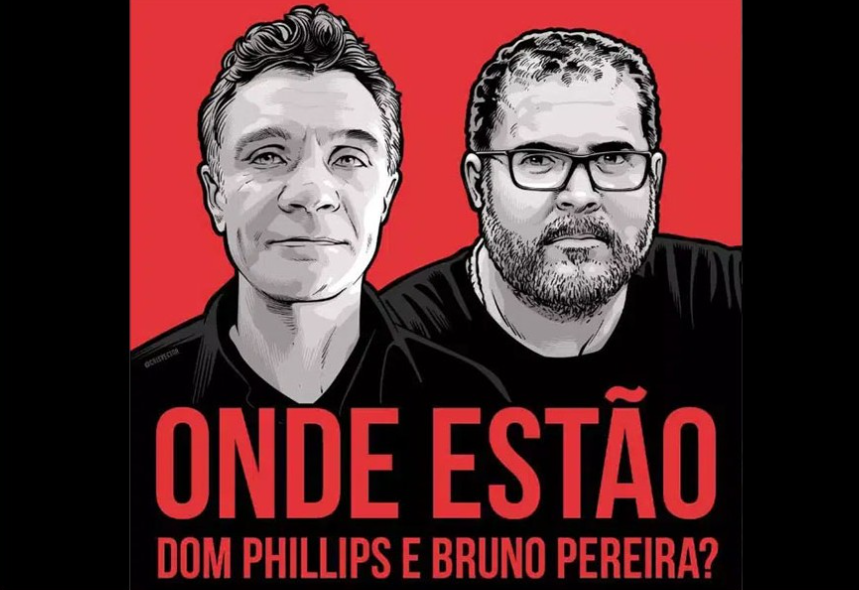Since Jair Bolsonaro won the 2018 presidential election, many analysts, almost always rightly so, have pointed to the growing threats to democracy in Brazil. However, even before the far-right former military man came to power, the Brazilian democratic project was already showing significant weaknesses. Two of them came back to haunt the country after the disappearance of British journalist Dom Phillips and the indigenist activist Bruno Araújo: the persecution of journalists and the genocide of indigenous peoples. The latter is closely related to the ongoing ecocide in what remains of Brazil’s biomes.
Dom and Bruno were traveling by boat in the interior of the state of Amazonas, near a region known as the Vale do Javari. The Guardian journalist was collecting material for a book on the Amazon rainforest when he and a former employee of the National Indian Foundation (FUNAI) were reported missing. Subsequently, the threats Bruno suffered from miners and hunters who used to invade indigenous lands to exploit their riches came to light. With much delay and little interest, the Federal Government claimed to have mobilized the Armed Forces to carry out the search for both citizens, who have still not been found.
So far, it is not possible to know what has happened to Dom and Bruno, but there is real cause for concern. According to UNESCO’s Observatory of killed journalists, 52 journalists have been executed in Brazil since 1993. In Latin America, only Mexico has more journalists murdered in that period. Not even in Colombia, a country that is trying to overcome a long and bloody armed conflict, have so many professionals been killed. As if that were not enough, UNESCO states that most of the cases in Brazil are unsolved.
In Brazil, threats to journalists are constant and come from politicians, businessmen, landowners, miners, drug traffickers, and militiamen. Even the sons of the current president use their social networks to promote violence against media professionals, going so far as to mock the brutal torture suffered by a well-known journalist during Brazil’s military dictatorship. Creating an environment in which media professionals can practice their profession without fear is imperative for democracy.
We hope that Dom Phillips and Bruno Araújo are found alive and can soon return to their activities. Unfortunately, this is not what happened to Eranildo Ribeiro da Cruz. A little less than a year ago, the journalist and social activist was found dead and with signs of torture in the state of Pará, neighboring Amazonas, where Dom and Bruno are missing. Eranildo covered local politics and the activities of social movements in the region. Possibly because he was not a European citizen and did not work for any major media, his murder had little repercussion outside of Pará.
Much has been said about the genocide of indigenous peoples in the Americas, but it is common for this process to be treated as a set of events lost in the distant past. What we observe daily in Brazil is that it is still in full force and is associated with the destruction of the environment and an economic model that reproduces historical inequalities.
Gold prospectors, loggers, large landowners, and large mining companies are advancing on the Amazon rainforest and the Cerrado, exploiting its resources, and leaving a trail of destruction and death. All this, often with the support or negligence of the authorities. The President of the Republic himself is a notorious supporter of the exploitation of economic activities on indigenous lands and prides himself on not having demarcated any reserves in his four years in office.
Brazil’s economic, political and social problems are innumerable, but some of them are at the base of a whole chain that prevents the achievement of the democratic project and citizenship promised by the 1988 Constitution. In this sense, the election and government of Jair Bolsonaro should not be interpreted as mere points off the curve, but as the tip of an iceberg that cannot be circumvented with the election of this or that candidate in the elections that will take place in the second half of this year. Brazil must face the obstacles to its democracy, such as the persecution of journalists and the genocide of indigenous peoples.
In short, the disappearance of Dom and Bruno leads us to ask: is it possible to speak of true democracy while journalists and activists are forcibly silenced when they dare to disturb the established powers? Is it plausible to speak of citizenship while entire peoples are exterminated at the whim of those who consider nature as a source of profit and not of life? We need more democracy to overcome the violent colonial project that founded and ordered Brazil by exploiting nature, annihilating indigenous peoples, and silencing dissenting voices.
Translated from Portuguese by Janaína Ruviaro da Silva











